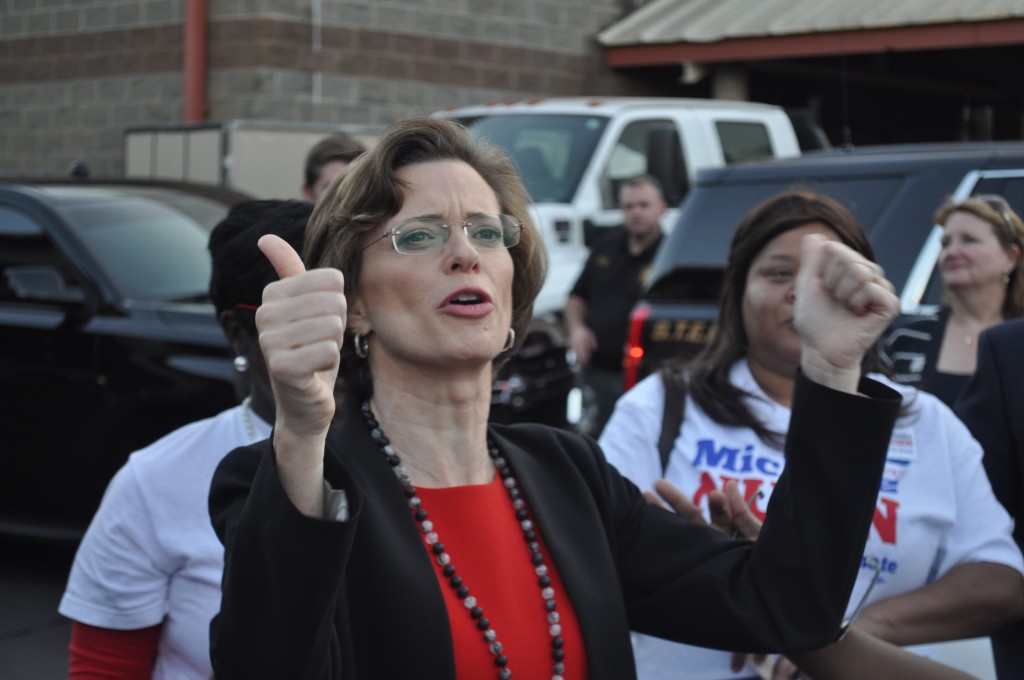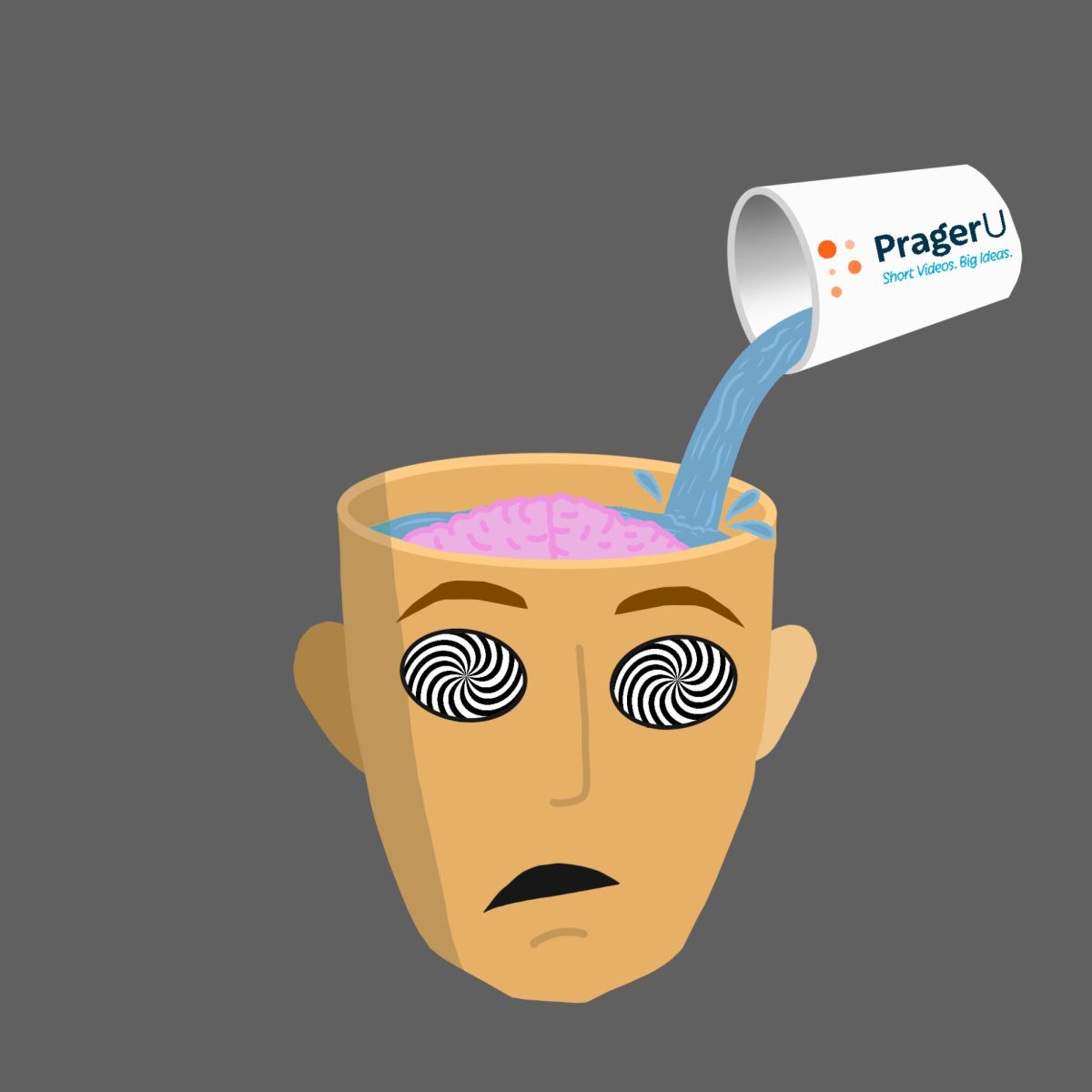
PERRY—A raucous crowd—with banners flying, partisan costuming and spirited screaming—met U.S. senatorial candidates Michelle Nunn (Democrat), David Perdue (Republican) and Amanda Swafford (Libertarian) and gubernatorial candidates state Sen. Jason Carter (Democrat), Gov. Nathan Deal (Republican) and Andrew Hunt (Libertarian) at the Georgia National Fair on Tuesday, Oct. 7, for two contentious debates. Frank Malloy, a local news anchor, moderated, with a panel of journalists asking questions over the din of the partisan crowd.
Prior to the debates, Perdue led Nunn in the polls by more than a three-point margin, while Deal and Carter were neck and neck.*
Retired Air Force pilot Larry Brudnicki, who came from his home in Warner Robins to attend, believes those statistics could change as a result of the debates.
“There have been enough Democratic policies that destroy the nation,” Brudnicki said. “[But] I think they’re going to need to talk it out and not fight it out.”
Sandra Traylor, a retired administrator from the Michigan state government, asserted the opposite: she thought Democratic candidates were going to hold the higher ground.
“I’m looking for [Nunn] to make clear exactly where she stands and dispute a lot of the negativity that’s been put out by [Perdue] through the media,” Taylor said. “And it’s time for a change. We are so overdue for a change.”
The senatorial debate kicked off with both candidates claiming home field advantage.
“Welcome to Perdue country,” Perdue said. He continued with an attack on Nunn’s “life in Washington.” Nunn countered with the fact that she grew up a couple miles south of the debates, while Perdue spent many years of his life as a top executive traveling around the world.

Perdue’s history of outsourcing jobs was a contested topic, and has also been the basis for Nunn’s most recent attacks against Perdue. Last week, Politico released a report outlining a 2005 deposition that Perdue made discussing his time as CEO of Pillowtex Corp. in 2003. When talking about his practice of outsourcing jobs, Perdue said, “Yeah, I spent most of my career doing that.” Days after the deposition came to light, in a press stop at a restaurant in Buckhead, when asked how he would defend his history, he responded, “Defend it? I’m proud of it.” In the debate, Perdue blamed Washington for the job losses; Nunn, however, refused to accept that answer.
“He would be the only senator that has built his career around outsourcing jobs,” Nunn said.
Next off, Perdue took the offensive, saying that Nunn’s campaign platform ranked agriculture No. 18 and rural issues No. 30. Nunn dismissed both accusations as false. Perdue also blamed Nunn for promoting the work of the national leadership of the Democratic Party—a connection Nunn has repeatedly disavowed in her campaign this year.
 “I’m not sure if he knows he’s not running against Harry Reid,” Nunn said.
“I’m not sure if he knows he’s not running against Harry Reid,” Nunn said.
“You’re dead wrong,” Perdue said. “I am absolutely running against Barack Obama and Harry Reid.”
Swafford, a former city councilwoman from Flowery Branch, said that her opponents were both the same: partisan politicians much like the Beltway regulars who already fill seats in the Senate. She received a smattering of applause from the audience while promoting the legalization of marijuana and the right of free marriage.
In the days following the debates, however, neither major candidate’s performance seemed to move the polls.
Dubose Porter, chair of the Democratic Party of Georgia, believes Nunn hit all of the right talking points in the debate.
“After last night’s debate, maybe [Perdue] should take a play out of his private sector credo and consider outsourcing his campaign,” Porter said in a press release following the debate. “It is evident that [he] is more interested in picking fights with windmills and running for Senate than serving the people of Georgia.”
John Padgett, chair of the Republican Party of Georgia, feels Perdue was the clear victor.
“Unlike Michelle Nunn, who ducks the tough questions and hides behind attack ads from her backers in D.C., we know where David Perdue stands on the key issues that matter to Georgia voters,” Padgett said in a press release. “As our next U.S. senator, David will end President Obama’s job-killing agenda and work to usher in a new wave of economic growth and opportunity.”
The clash that characterized the senatorial debate continued as the candidates gave way to their gubernatorial counterparts.

From the start, Deal touted positive economic statistics from his first term, arguing that he has made Georgia the best state in which to do business, that he has created 300,000 jobs and that he has put more money into education since Gov. Carl Sanders did in the 1960s.
“If you think these last four years have been great, and I believe they have been, just wait,” Deal said. “We’re going to do even more.”
Carter and Hunt both disagreed, citing Georgia’s August unemployment rate of 8.1 percent, which is much higher than the national August unemployment rate of 6.1 percent.
The education budget soon emerged as the crux of the debate: Carter said it is still $750 million underfunded, but Deal pointed out that Carter has approved three out of the four budgets he has introduced to the Senate. Carter said he voted for them because they generally pass unanimously but that he finally came to his senses this past February.
“I could not sit by any more and continue to vote for budgets that continued to underfund education by billions of dollars year after year after year,” Carter said.
Both Carter and Hunt attacked Deal’s history of poor ethics, which has resulted in more than $1.8 million of fines.

“Imagine a world where the governor of Georgia does not come on the radio and talk about an ethics scandal,” Carter said. “Wouldn’t that be nice?”
Deal said the allegations had no merit, but Porter was not convinced.
“Facts matter—no matter how grizzly they are—and Nathan Deal can’t hide the facts,” Porter said in a press release. “Georgia has the highest unemployment rate in the nation, ethics scandals plague his administration, our transportation system has become a national cartoon, he wrecked HOPE and underfunded our education system.”
Ben Simonds-Malamud, Madeline Veira and Ludovica Longo contributed to the reporting of this story.
*All poll data are drawn from the Real Clear Politics average.













